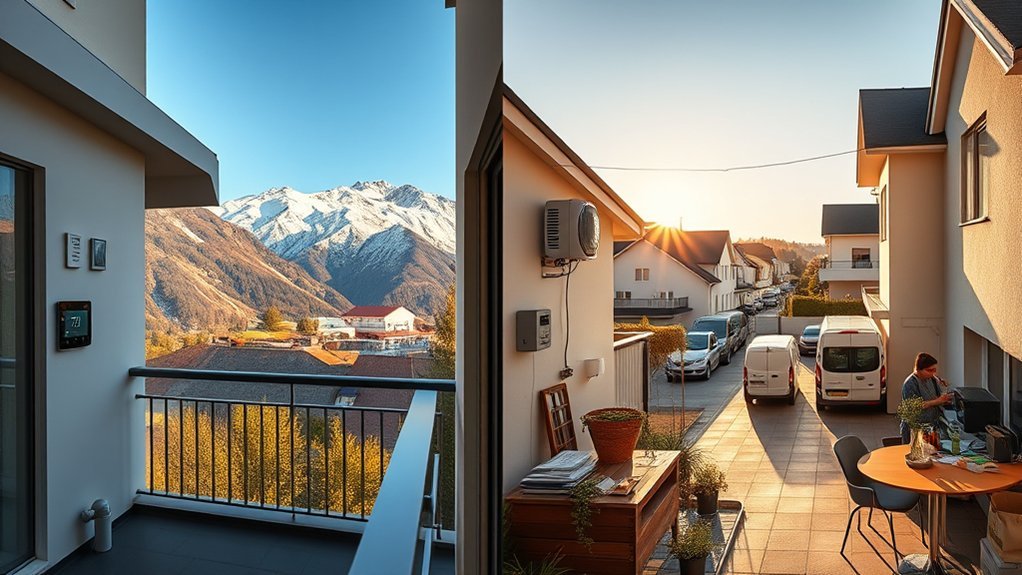You’ll pay roughly 25–30% more living in Switzerland than in the United States (recent cross-country benchmark shows ~27% higher overall), with housing, restaurants and groceries driving the biggest gaps (see Livingcost, 2025-10-13). Rents and city-center purchase prices are far higher, though Swiss mortgages tend to carry lower long-term rates (e.g., 10-yr fixed in CH ~1.75–2.00% as of October 2025 per Zuger Kantonalbank; US 30-yr fixed averaged ~6.19–6.28% on 2025-10-20 per Bankrate). Transport, taxis and some services are pricier, while utilities and internet can be cheaper. Nominal wages are higher and taxes vary by canton, so employer expat packages often narrow the gap — keep going to see detailed comparisons and tactics.
Quick Comparison Summary and Practical Rule of Thumb

While exact costs vary by city and lifestyle, you should expect Switzerland to be roughly 25–30% more expensive than the United States—so think of $100 in the U.S. as about $127 in Switzerland (Livingcost, 2025-10-13).
You’ll find the largest divergence in housing: Swiss property valuations can exceed U.S. levels by hundreds of percent, and a one-bed city-center rent typically runs 14–19% higher.
Everyday spending is also higher: a basic restaurant meal averages about $30.39 in Switzerland versus $20.00 in the United States (Numbeo, last update 2025-06-10), and grocery markets trend roughly +43–50% overall.
Transportation and fuel add to the gap—monthly transit passes are about $102 compared with $69.50, and gasoline sits near $2.12 per liter in Switzerland versus $0.92 per liter in the U.S. (both mid-grade benchmarks; GlobalPetrolPrices, 2025-10-13; GlobalPetrolPrices, 2025-10-13).
That said, some grocery items (bottled water, rice, apples, oranges, potatoes, onions) can be cheaper, so targeted shopping reduces impact.
Use the $100→$127 rule of thumb for rapid budget adjustments when comparing cost of living across Switzerland and the United States. Additionally, understanding local prices is crucial for making informed financial decisions when relocating.
Overall Cost of Living Index and Key Differences

You can use the $100→$127 rule from the quick summary as a shorthand, but the overall index highlights where that extra cost comes from: Switzerland’s living costs run about 25–32% above U.S. levels, driven largely by housing (purchase prices much higher and city-center rents notably higher), with services and leisure especially pricier overall. You’ll see transport and groceries also push the index up: public transit passes often cost more, gasoline is higher per liter (CH ~$2.12 vs US ~$0.92) (GlobalPetrolPrices, 2025-10-13; GlobalPetrolPrices, 2025-10-13), and markets trend costlier overall, though select items may be cheaper. For expats comparing Switzerland vs United States living expenses, this means budgeting more for daily services and discretionary spending rather than only housing.
| Category | Switzerland Premium | Typical Impact |
|---|---|---|
| Overall index | +25–32% | Higher baseline cost |
| Services/leisure | Higher | Eating out, hobbies |
| Groceries | Higher (~+43–50% overall) | Mixed item pricing |
| Transport | Higher (passes, fuel) | Commute and fuel |
Housing, Property Prices, and Rent Comparisons

Expect to pay substantially more for Swiss housing: apartment purchase prices in city centers run about $18,825 per m²—roughly 319% higher than U.S. city-center averages (~$4,491/m²)—and rents are also elevated (one-bed city-center ≈ $1,889 vs $1,659 in the U.S., +13.9%; three-bed ≈ $3,598 vs $3,048, +18.0%) (Livingcost, 2025-10-13).
You’ll find purchase prices drive most differences: mortgages in Switzerland tend to offer lower long-term rates (10-yr fixed ~1.75% as of October 2025 per Zuger Kantonalbank; US 30-yr fixed averaged ~6.19–6.28% on 2025-10-20 per Bankrate), which can partially offset higher capital costs.
Utilities for a single person are about 30% higher in Switzerland ($162 vs $125), though internet costs are lower ($58.10 vs $67.50) (Livingcost, 2025-10-13).
Practically, plan to increase housing budgets by roughly 25%–30% when moving from the United States to Swiss city centers. Additionally, understanding the repair costs associated with housing maintenance can further influence your overall budget.
Key takeaways:
- Expect much higher upfront purchase costs and rents.
- Benefit from lower mortgage rates but face higher utilities in some cases.
- Budget ~25%–30% more for equivalent living in Swiss urban cores compared to the United States.
Restaurants, Groceries, and Market Prices

Housing costs often dominate your budget, but food and dining quickly add up once you settle in. You’ll find eating out in Switzerland is markedly pricier: a basic meal averages $30.39 versus $20.00 in the U.S. (Numbeo, last update 2025-06-10), dinners for two run about $114 vs $76.50, and fast-food meals are $19 vs $11.50. Pub beer and cinema-linked dining trends follow the same premium—expect around $9.09 for a beer in Switzerland compared with $6.31 in the U.S. (Livingcost, 2025-10-13).
On groceries, overall market prices are about 43–50% higher in Switzerland. Staples illustrate the gap: 1 L milk $2.25 (vs $1.11) and 1 kg chicken breast $26.80 (vs $12.30). Yet some items buck the trend—1.5 L bottled water, white rice, apples, oranges, potatoes and onions can be cheaper in Switzerland, even though meat and many dairy products are significantly more expensive. Prices vary by city and season, so you should plan budgets using local supermarket checks and track dining frequency to manage the predictable premium.
Transportation, Fuel, and Taxi Costs

You’ll notice public transit in Switzerland runs about 47% pricier for monthly passes and roughly 84% higher per-ticket than in the United States, which affects regular commuters.
Fuel is dramatically more expensive—about $2.12 per liter in Switzerland versus $0.92 per liter in the U.S. (mid-grade benchmarks; GlobalPetrolPrices, 2025-10-13; GlobalPetrolPrices, 2025-10-13)—while taxis carry even steeper surcharges across base, per-km and waiting rates.
Factor in that new cars cost substantially more in Switzerland, and overall transportation ownership and everyday mobility are materially costlier for expats. Additionally, understanding the average cost estimates for vehicle repairs, such as air conditioning hose replacements, can help expats budget more effectively.
Public Transport Price Differences
While Switzerland offers extensive and reliable public transport, you’ll pay noticeably more: a monthly pass runs about $102 vs. $69.50 (≈+47%), single tickets average $4.33 vs. $2.35 (≈+84%), and gasoline costs roughly $2.12/L compared with $0.92/L in the U.S. (fuel: GlobalPetrolPrices & GlobalPetrolPrices, 2025-10-13).
You should expect higher everyday transit costs but also higher service frequency and punctuality. Compare choices by travel pattern and budget.
- Monthly passes: $102 (CH) vs. $69.50 (US) — evaluate regular commuting needs.
- Single tickets: $4.33 (CH) vs. $2.35 (US) — short trips add up fast.
- Fuel: $2.12/L (CH) vs. $0.92/L (US) — influences multimodal decisions (GPP CH; GPP US, 2025-10-13).
Use these metrics to decide whether a season ticket, occasional rides, or mixed-mode commuting gives the best value.
Fuel and Taxi Premiums
Because fuel and taxi costs are markedly higher in Switzerland, your day-to-day transport budget will rise even if you drive infrequently. Gasoline runs about $2.12 per liter in Switzerland versus ~$0.92/L in the U.S. (mid-grade; GPP CH; GPP US, 2025-10-13). Monthly transit passes cost ~$102 in Switzerland versus $69.50 in the U.S. Taxi pricing is steeper: base fares, per-km and waiting rates are all higher in Switzerland, making an 8 km ride more expensive than a comparable U.S. trip.
| Item | Switzerland | United States |
|---|---|---|
| Gasoline (per L) | $2.12 | $0.92 |
| Monthly pass | $102 | $69.50 |
| 8 km taxi | $40.80 | $18.40 |
Utilities, Internet, Health Care, and Services

Although overall living costs can tilt either way, utilities and basic services show clear differences between Switzerland and the United States that expats should note: monthly apartment utilities run about $162 in Switzerland vs $125 in the U.S. (≈30% higher in Switzerland for singles), home internet (50+ Mbps) costs roughly $58.10 vs $67.50 (≈14% cheaper in Switzerland), outpatient doctor visits average $144 vs $124, and routine services like gym memberships ($90.90 vs $52.30), cinema tickets ($23.90 vs $14.50), and haircuts ($46.70 vs $21.60) are consistently pricier in Switzerland, indicating higher utilities but also higher personal service and healthcare out-of-pocket expenses for many expats (Livingcost, 2025-10-13).
You’ll pay more for most routine services in Switzerland, but internet costs can be lower. When budgeting, prioritize reliable insurance and factor in routine service premiums. Additionally, understanding repair costs can help expats manage unexpected expenses related to technology.
Key considerations for your monthly plan include:
- Insurance and out-of-pocket healthcare exposure.
- Regular service costs (gym, haircuts, entertainment).
- Savings from competitive internet pricing.
Salaries, Taxes, and Purchasing Power for Expats

Compare net income and real purchasing power closely: nominal salaries for comparable expat roles often run higher in Switzerland ($7,360 after tax) versus the U.S. ($4,539 after tax), but Switzerland’s roughly 27% higher cost of living must be factored in—practically $100 in the U.S. equates to about $127 in Switzerland (Livingcost, 2025-10-13). You should compare gross vs net, factoring cantonal tax strategies, social security, and mandatory health premiums. Employer packages in Switzerland materially reduce housing and relocation expenses, narrowing real gaps. PPP-adjusted wages favor Switzerland due to higher nominal pay; however, routine spending (meals, transport, groceries) still carries a premium. Understanding the total cost of living, including taxes and housing, is essential for making an informed decision about relocation.
| Metric | Typical difference |
|---|---|
| Nominal salary (expat role) | Switzerland higher |
| After-tax salary | Switzerland $7,360 vs US $4,539 |
| Housing cost impact | Switzerland much higher |
| Tax/social deductions | Variable; Switzerland can be favorable |
| Employer expat package effect | Large in Switzerland |
Use scenario-specific net-pay calculations to decide which market gives you stronger purchasing power.
Cultural and Seasonal Cost Variations

Expect noticeably higher prices in Switzerland during peak tourist seasons and major holidays, which help drive its overall cost of living about 25–32% above U.S. levels.
You’ll see seasonal grocery shifts—domestic staples stay stable while imported items and fresh produce can spike 10–30% in low-season months—and winter pushes energy and transport costs higher.
Cultural norms like frequent dining out and premium service, combined with tourist demand, can boost restaurant and transit prices at peak times compared with typical U.S. levels. Additionally, regular maintenance of vehicle systems, including exhaust repairs, can influence overall living costs as expats budget for unexpected expenses.
Peak Tourist Seasons
Seasonally, you’ll see clear cost swings: Switzerland’s summer (June–Aug) and winter ski (Dec–Feb) peaks typically push restaurant and market prices above U.S. baselines—dining and markets show the widest gaps—while lodging, ski leisure, and short-term transport surge even more.
You should budget for higher short-term fares and taxis, even though transit pass and single-ticket baselines ($102 monthly, $4.33 single) remain relatively stable; it’s your total usage during tourist weeks that tends to spike.
U.S. spikes are more localized (cities, spring break, holiday corridors) and moderated by a lower overall cost of living.
Key tactical considerations:
- Time travel to shoulder months.
- Book accommodation early for fixed rates.
- Shop staples locally to limit markup.
Holiday Price Spikes
When holidays and peak tourist windows hit Switzerland, you’ll see sharp, measurable price spikes across dining, groceries, transport and short-term accommodation—restaurant meals rise above the normal premium versus the U.S. (basic meal CH $30.39 vs US $20.00) (Numbeo, 2025-06-10).
You should expect your overall spending on grocery staples (milk ~CH $2.25, gasoline ~CH $2.12/L) to feel higher around winter and summer peaks, amplifying the market’s higher baseline versus the U.S. (fuel: GlobalPetrolPrices, 2025-10-13).
Public transport experiences demand-driven pressure (single ticket ~$4.33, monthly pass ~$102), with crowding and occasional dynamic fares on tourist routes.
Short-term rentals and ski-season lodging spike sharply on top of higher city rents (1-BR center CH ~$1,889 vs US ~$1,659).
Seasonal leisure and activity costs also surge, widening the sports & leisure gap.
Seasonal Grocery Shifts
How will your grocery bill change with the seasons in Switzerland? You’ll see measurable swings: local fruit can be cheaper year-round versus the US, but staples like milk (CH $2.25/L vs US $1.11/L) and many basics cost more, and winter import reliance raises prices.
Tourist and holiday peaks push perishables and ready-to-eat items higher, contributing to a ~43–50% higher groceries index versus the US. Short growing seasons and higher fuel (gasoline CH $2.12/L vs US $0.92/L) amplify delivered-goods costs in winter and travel peaks (fuel: GPP CH; GPP US, 2025-10-13).
Expect cultural shopping patterns—frequent buys, premium fresh items—to increase your out-of-season spend.
- Plan seasonal menus
- Buy local in harvest months
- Bulk staple purchases when prices dip
Frequently Asked Questions
Is It Cheaper to Live in Switzerland or the USA?
It’s generally cheaper to live in the USA; you’ll pay about 25–32% less overall. Housing, restaurants, groceries and transport cost more in Switzerland, though higher wages, safety and public services can partially offset expenses.
What Is the Most Expensive Country in the World 2025?
Rankings vary by dataset and methodology. Recent 2025 mid-year country and city indexes generally place Switzerland among the top 2–3 most expensive countries globally, often alongside Bermuda, Cayman Islands, Bahamas and Iceland (see Numbeo 2025 mid-year).
What Salary Is Needed to Live Comfortably in Switzerland?
You’d need roughly CHF 120,000–150,000 annually (~$132,000–165,000) to live comfortably in Switzerland, depending on city and family size; budget higher for Zurich/Geneva, accounting for elevated rent, food, transport, and lifestyle costs.
Are Salaries Higher in Switzerland or the USA?
You’ll generally earn more nominally in Switzerland—average after-tax salary is CHF 7,360 in Switzerland versus $4,539 in the USA, but higher living costs (about +27%) mean you’ll need to evaluate real purchasing power versus comparable U.S. offers (Livingcost, 2025-10-13).
Conclusion
You’ll pay significantly more in Switzerland overall, yet you’ll often get higher wages and stronger public services in return — a trade-off that’s both pragmatic and personal. Think of it as paying for precision: higher rent, groceries, and services offset by superior healthcare, transit, and safety. Use local salary and tax data to judge real purchasing power where you’ll live, then budget for housing and healthcare first — those drive your expat cost reality.


